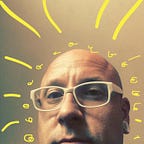A Model for Public Meetings
Democracy means “rule by the people.” It requires each of us and, in my opinion, requires more than voting. Democracy only works if we get involved and do not rely on government officials to do all the heavy lifting.
In 2018, I started a series of public meetings because my city, Omaha, did not offer opportunities for residents and officials to meet and discuss issues that affect the community. Imagine a city of 480,000 people and no resident engagement program. Decisions and policies are made without asking people for input, help, or opinions. That’s Omaha.
Some politicians were holding “town hall” meetings, which were essentially speeches designed to tell people that everything was being handled just fine, no need to worry, everything is under control.
That is not democracy.
We lacked a public forum to discuss issues like youth incarceration, waste management, or privatized control of public land. Since the City was not willing to meet with residents, I designed a public meeting to do several things:
- Establish a gathering where everyone was welcome to attend, speak, and take action. This included specifically inviting people from varied backgrounds, socioeconomic statuses, and access to power.
- Educate people on the realities of a topic, presenting public data and original documents. This included the process of requesting information from government bodies.
- Focus the majority of the meeting on conversation, fielding questions, generating suggestions, and emphasizing the power of the people to act. A subject matter expert was sometimes invited to help provide context during the conversation but was not a lecturer.
- Established the demand for public meetings. We demonstrated residents’ willingness to engage and pressured the government to take responsibility for meetings instead of having an outsider conduct the conversations. We published a meeting recap — complete with the concerns and suggestions from the attendees — and sent all documents directly to elected officials, department directors, and media.
Each meeting was limited to 60 minutes, and 40+ minutes were dedicated to the conversation about the topic. We did not have an expert telling people what to think or do. The general flow of a meeting looked like this:
- Two-minute introduction of Omaha Public Meetings and participatory democracy
- Two-minute explanation of expectations at meeting
- Fifteen-minute presentation on the topic and supporting materials
- Twenty-minute conversation about questions and concerns
- Twenty-minute conversation about possible solutions and how to get involved
- Two-minute conclusion to thank participants, encourage them to contact officials, and to invite them to bring a friend to the next meeting
These gathering were based on increasing participatory democracy. This approach emphasizes the power of the people to take responsibility for the city through direct action. [LINK] Issues that affect the entire community should engage the entire community. NOTHING ABOUT US WITHOUT US.
This meeting model is not unique, but I felt that it worked because the focus was on building power among residents. I wanted them to feel ownership of issues, the importance of their involvement, and the expectation that the City should make public engagement a priority.
[Note: as I receive feedback and requests for clarification, I will update this post.]
_____
About Omaha Public Meetings
Omaha Public Meetings is a nonpartisan entity focused on public engagement, resident input, and government accountability at the municipal level.
Omaha Public Meetings are designed around one principle: participatory democracy.
Participatory democracy gives everyone in our city the opportunity to make meaningful contributions to decision-making. It means we the people are consulted in how our city is built and run. It acknowledges that all power comes from the people. We want a government that works for us but also works with us.
We will organize to make it a reality in the City of Omaha.
This is our shared goal: to get City Hall to instate a resident engagement program with all City Departments and the Mayor’s Office. Omaha is our city, and our voices must be heard.
NOTHING ABOUT US WITHOUT US
